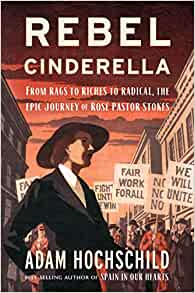Rebel Cinderella
 Rebel Cinderella: From Rags to Riches to Radical, the Epic Journey of Rose Pastor Stokes, by Adam Hochschild (Boston, MA: Houghton Mifflin, 2020)
Rebel Cinderella: From Rags to Riches to Radical, the Epic Journey of Rose Pastor Stokes, by Adam Hochschild (Boston, MA: Houghton Mifflin, 2020)
Adam Hochschild is a very good historian who has written major works on World War I, on the movement to end the British slave trade, and on the Belgian role in the Congo. Always, he includes oppositional movements from below, which makes his work interesting for labor and radical historians. His new biography of Rose Pastor Stokes is, for him, a minor work. But even a minor work from Hochschild is valuable.
At the heart of the book is the marriage of Rose Pastor, an immigrant Jew from Poland, to Graham Phelps Stokes, a millionaire WASP. She began work, in a Cleveland cigar factory, at 11. He inherited his money and position from the powerful Dodge, Phelps, and Stokes families. In 1905, when Rose and Graham fell in love and married, and for years afterwards, they were front-page news. Attracted to reform and radical movements, they became Socialists and activists, and she became the Rebel Cinderella of the title. A powerful and popular speaker, whether addressing striking garment workers or wealthy liberals, she advocated socialism, birth control, and peace.
Rose and Graham’s many radical friends tended to see their marriage as foreshadowing a future in which the barriers of class and ethnicity would fall. In reality, the barriers reasserted themselves, and it was their marriage that collapsed. WWI was the turning point. As a socialist, Rose opposed America’s entry; as a patriot, Graham supported America’s entry. He gradually reverted to the values and attitudes of his conservative family; she went on to support the Russian Revolution, becoming a Communist.
The marriage of Rose and Graham came apart as the larger left, which had adopted them as darlings, came apart. Hochschild is good on the hopeful spirit of the pre-war American left, and even better on the decline of the left, after war was declared in 1917.
There is a fascinating moment, as the U.S. declares war, when Rose falters, briefly supporting the war, resigning from the Women’s Peace Party and the Socialist Party. It’s only a moment. The repression which hit her radical American friends, and the hopeful example of the Bolshevik revolution, brought her back to her leftist roots. She quickly moves on, and so does Hochschild. But why did she falter? What does it tell us about her, or about the power of patriotism in 1917? Unfortunately, Hochschild is unable to use this moment to deepen his story.
In the 1920s, as Rose becomes a true believer in Soviet Communism, she turns on friends who do not share her faith. It is painful to see her attack Eugene Debs and Emma Goldman. Hochschild suggests that Rose and Graham, who became bitter political enemies, shared an underlying elitism. Like her rich husband, she always tended to see working people as needing enlightenment from above. At the height of the pre-war labor movement, in 1913, the year of the Paterson Silk Strike (which she supported, and at which she spoke), Rose confided to her diary: “The people … are still blind, blind!” (p. 222) In this sense, her Communism grew in part out of her belief in a radical vanguard.
Still, Rose Pastor Stokes is an impressive hero, never fully comfortable with the wealth she married into, always loyal to the values that grew out of her experience as a cigar worker. From 1905 until her death in 1933, she sacrificed her privilege to support the struggles of working people. Graham, her husband, is a less interesting figure. But his Uncle Will – William Earle Dodge Stokes –provides Hochschild with a proper villain. Uncle Will frequently denounced “socialistic Jews, who have no nationality,” advising the various authorities whom he knew to “get rid of these people.” Uncle Will had one socialistic Jew particularly in mind, the one who had married his nephew. Rose Pastor, he warned an Assistant Attorney General, “was born under a cloud with a grievance, and she is dangerous.” (pp. 189-190)
In Rebel Cinderella, Hochschild uses the failed love to illustrate the destructive power of war and class, In To End All Wars, his fascinating study of England in WWI, he traced a similarly fraught relationship. Charlotte Despard and John French were on opposite sides, she an organizer of the radical peace movement, he an organizer of Britain’s military machine. They were brother and sister and deeply loved each other, but even though they tried to stay close, their relationship did not survive the war. Hochschild’s ability to make the political personal is one of his great strengths as an historian.
Reviewed by Steve Golin, Professor Emeritus of History at Bloomfield College, NJ.
